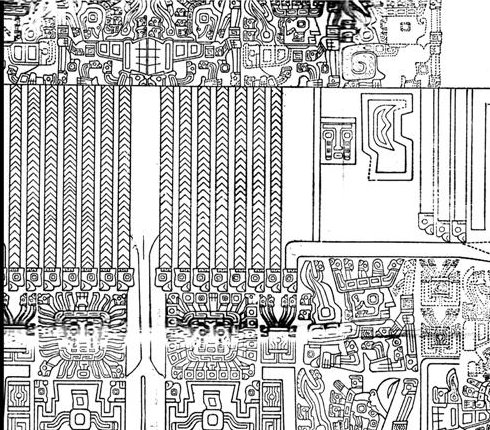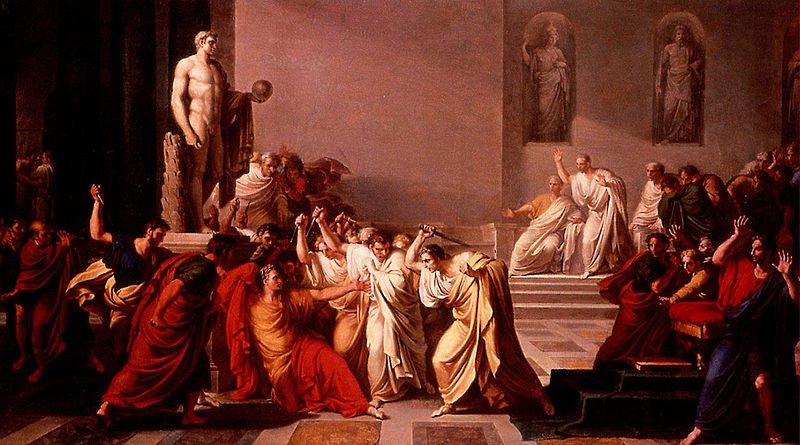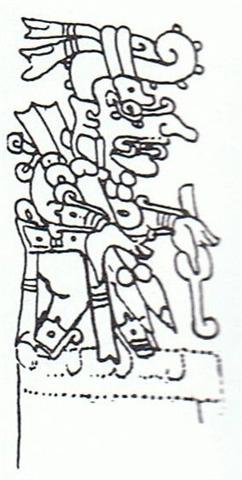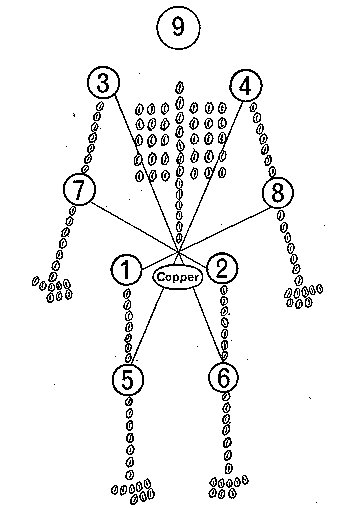Once again. There was a vertical teka (upright) in the center among the hanging tresses of Pachamama
and Julius Caesar was killed by an Iron dagger in the House of the Senate:
... At the beginning of 44 B.C. - when Ceasar was still alive - the Senate decided to raise statues of him in all the temples and to sacrifice to him on his birthday in the month Quintilis, which in honour of him was renamed July. He was raised to the status of a god (among the other gods of the state) under the name Jupiter Julius. Marcus Antonius, who this year was consul together with Caesar, became high priest and responsible for the ceremonies. In the middle of February, at the time of the old feast of Lupercalia [Lupus = Wolf], he ran around naked and whipped the Roman ladies with thongs made from goat-skin [februa], in order to promote their fertility ... ... The brutes of spring caused the downfall of both Captain Cook and Julius Caesar. We are close to the key myth of mankind, that which explains the regeneration and of growth. Once at least some people kept the tradition living. I became interested in what really happened in March 15 and reopened Henrikson to find out: Caesar was forewarned of the threat by the prophet Spurinna, who told him that a great threat was coming at Idus Martiae or just before. The day arrived and Caesar was still living, walking to his meeting with the Senate when he happened to encounter Spurinna and told him jokingly that he was still alive. Spurinna calmly answered that the day had yet not ended. The Romans divided their months in two parts and the dividing point was Idus, which in some way was connected with the full moon. March 15 was the midpoint of March, which is close to spring equinox. The old agricultural year defined the beginning of the year to the time when sun returned, and it was connected with Mars ... ... The chaotic tumult in the Curia (where the Senate had their meeting and where they killed Caesar) resulted in his dead body left lying on the floor, while all the Senators panicked and ran out through the doors in different directions. They had planned to throw his body into the river, but the time of plans and order was in the past. Instead, in the afternoon, three of the slaves of Caesar came and fetched his body, and carried him on a stretcher to his home south of Forum - and one arm was hanging down in the corner where the 4th slave should have been ... The tresses of the World Mother were divided in the center by a great 'broken dart'. 7 + 1 + 7 = 15 and we could therefore try to search for the place corresponding to Idus in the center between the pair of tao glyphs:
267 (Weeping) - 7 = 260, and 260 - 183 = 77:
... A vestige of the practice of putting the king to death at the end of a year's reign appears to have survived in the festival called Macahity, which used to be celebrated in Hawaii during the last month of the year. About a hundred years ago a Russian voyager described the custom as follows: 'The taboo Macahity is not unlike to our festival of Christmas. It continues a whole month, during which the people amuse themselves with dances, plays, and sham-fights of every kind. The king must open this festival wherever he is. On this occasion his majesty dresses himself in his richest cloak and helmet, and is paddled in a canoe along the shore, followed sometimes by many of his subjects. He embarks early, and must finish his excursion at sunrise. The strongest and most expert of the warriors is chosen to receive him on his landing. The warrior watches the canoe along the beach; and as soon as the king lands, and has thrown off his cloak, he darts his spear at him, from a distance of about thirty paces, and the king must either catch the spear in his hand, or suffer from it: there is no jesting in the business. Having caught it, he carries it under his arm, with the sharp end downwards, into the temple or heavoo.
On his entrance, the assembled multitude begin their sham-fights, and immediately the air is obscured by clouds of spears, made for the occasion with blunted ends. Hamamea (the king) has been frequently advised to abolish this ridiculous ceremony, in which he risks his life every year; but to no effect. His answer always is, that he is as able to catch a spear as any one on the island is to throw it at him. During the Macahity, all punishments are remitted throughout the country; and no person can leave the place in which he commences these holidays, let the affair be ever so important ...
Tagata. Man; human being in general; the plural is gagata. Vanaga. Man, mankind; tagata ke, some one else; tagata no, nation. P Pau.: tagata, man. Mgv.: tagata, man or woman. Mq.: enata, enana, kenana, man. Ta.: taata, id. Tagataa, incarnate. Tagatahaga, human, humanity. Churchill.
|





